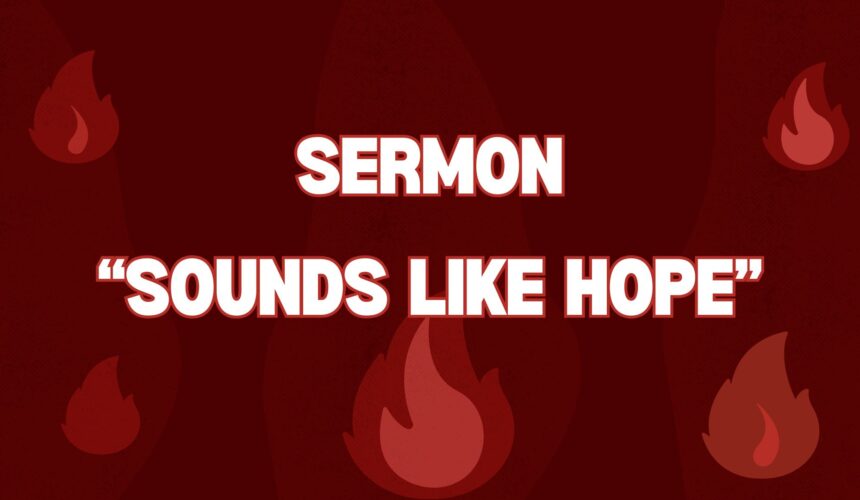Sounds Like Hope
Pentecost Sunday
June 8, 2025
Acts 2:1 – 13
I don’t know how many times I’ve read the story we just heard from the second chapter of the Biblical Book of Acts, but if I had to estimate, I guess a round number would be: a bunch. And I’ve probably written at least 25 sermons on this passage because we read it in worship every year around this time. But there’s a funny thing about scripture: it comes to meet you wherever you are. The messages we hear from it shift as we change and grow. I might read a passage from the Bible now and hear one message, and then in ten years – or even next year or a month from now – when I read it again I’ll hear something completely different. So a few weeks back, as I was reading and praying to prepare for this sermon, I noticed something that had never occurred to me before: this scene from Acts 2 must have been really loud, and probably pretty chaotic.
The story doesn’t exactly describe it that way. At least if you just sort of hit the highlights the whole thing might sound pretty smooth and predictable and orderly. In the first chapter of the Book, Jesus has told his followers they will receive power from the Holy Spirit. So here in the second chapter, that’s what happens. The disciples are all together, in a house. These guys are not from Jerusalem. They don’t live there. So I don’t know, maybe Matthias got them an Air BnB or something, but Acts says they’re all together in a house, in one place. Suddenly they hear a sound like wind, and see what looks like tongues of flame dancing in the air between them and over each other’s heads. Then, in the part of the story that comes immediately after what we just heard, Peter speaks to the gathering crowd and preaches what turns out to be a powerfully compelling message, because at the end of his sermon about 3000 people step forward to be baptized. (Which beats my best day by a factor of, I don’t know, about 1000.) And these newly baptized Christians, they become the first converts of the new faith.
It’s only when we begin to think about the details of the story that things start to seem a little less smooth and orderly. First of all, that moment in Jerusalem – like I said, it had to have been really loud. You have twelve people sitting in a room or a house together, and they hear a sound that Acts describes as being “like a violent wind.” Suddenly they all begin talking, but they’re each speaking a different language that none of them know. And somehow, those sounds are enough that people outside the house stop what they’re doing and begin to gather around it. And we’re talking about a lot of people here. If Peter preaches a sermon and brings three thousand people into the faith, how many people do you figure are standing out there?
How loud do you think you would you have to talk to gather that many people from, say, your neighborhood on the sidewalk and the street outside your house? How many languages would have to be coming from inside to make people think something weird was going on and start paying attention? How loud and localized would the wind have to be to convince those people that it was coming in or from or through your house in particular? If I try to imagine what all this sounds like, in my mind’s ear it sounds like noise and wind and yelling and chaos.
Then there’s the reaction from the crowd. I imagine some people probably just kept walking because the whole scene was just a little too weird to deal with. But among the crowd who does gather, opinions seem to vary about what’s going on. Some people seem to hear the Apostles’ voices in their own language, speaking about what Acts calls “God’s deeds of power.” The story says they are “amazed and perplexed” and wondering what’s going on. Others are not so impressed. They just think the apostles are drunk and spouting gibberish.
And then somehow Peter, who’s never exactly been a Winston Churchill level orator before this moment, steps up and preaches this monster sermon that converts 3000 people – which means, if nothing else, that he too must have had some kind of divine amplification to add to an already noisy environment just so that many people could hear what he’s saying.
Now, it does make sense that there would be a lot of people walking past whatever house the disciples were in. Pentecost was a Jewish holiday long before it was a Christian one – it celebrates the first harvest, gathered 50 days after the Passover. So you can imagine a lot of people in the streets, speaking different languages, from different regions; people who live in Jerusalem, some of them native and some transplants from elsewhere; and people visiting for the harvest festival. So even without the Pentecost miracle described in this story, it would have been bustling and busy with a huge range of people – Jews from all over the known world, speaking different languages, coming from different cultures, with different histories and different customs.
In the Christian tradition, Pentecost is often called “the birth of the church.” I sometimes think of it as our own festival of the first harvest, three thousand people becoming part of this new religious movement the Apostles are now organizing on their own, without the physical presence of Jesus. The first harvest of the Spirit, the first harvest of the church.
And maybe in that way, it kind of makes sense that it would have been a loud and confusing and chaotic moment. This new thing, the church, was being born. It makes perfect sense to me that some people might just keep walking, because they don’t want to deal with the mess and they don’t see how it’s relevant to their history or their lives. And I’m sure others would be amazed and perplexed and not know what was going on or what it meant. And of course there would be people who sneered at the whole thing and thought it was probably just a bunch of drunks enjoying the fruits of the harvest a little too much.
So what does it sound like in your mind’s ear, all this confusion and roaring wind and flame and voices in different languages and people with a range of responses, some of them marveling and some of them sneering and no one quite knowing what’s going to happen next?
We might say it sounds like chaos. Or we might say it sounds like hope. We might say this is just how it sounds when God is doing a new thing in a difficult and divided environment. If we really want to go out on a limb, maybe we could say it sounds like June 2025.
In hindsight, it’s easy to think that the movement of God’s Spirit at Pentecost in first century Jerusalem would have been clear and unmistakable. But I don’t think that’s what the story says, and I don’t think it ever is. Seeing what God is doing, following the Spirit’s lead, takes discernment and practice. It takes prayer and commitment. And even then, it’s easy to make a mistake. Even the most inspired social movements are fragile; they can easily go off the rails. The church does it all the time: that’s sad, but we all know it’s true because we’ve all seen it happen.
But even so, even in the confusion and noise of our time, all the varied reactions and passionate disagreements and the online and offline sneering, the people trying to just keep their heads down and walk on without getting involved, maybe somewhere in all that God is bringing something new into life for our own time, a way of living God’s dream for the world, something untried because we haven’t thought of it yet.
We may not know what it is, exactly. We don’t know what new hope God is coaxing to life. But then, I take comfort in the idea that Peter or the other Apostles didn’t know either. They could not possibly have imagined the church in all its forms, all the traditions it would plant. They just knew that they had to let themselves be guided by the Spirit as they created and held open space for this new thing to take root and blossom and grow.
If that’s true, there’s one important element that allows the church to come into being on that day in Jerusalem. In the Acts story, the new thing God is doing is driven by the Spirit. But it takes concrete shape when a Galilean peasant fisherman with no religious authority whatever except his experience of life with Christ steps up and invites the people to reinterpret their history. He quotes the prophets and Psalms; he remembers their ancient stories and their heroes, and he invites them to understand all of it in light of the life and teachings and death and resurrection of Jesus. As unlikely a leader as he might have been, God could use him and all of those first followers of Christ to embody a way of life that had the potential to transform the world – a way whose allegiance is not to power or status as those things are traditionally understood, but to a crucified Messiah who invites everyone into the Kindom of Heaven, regardless of where we’re from or what language we speak. And that vision is powerful enough to inspire 3000 people to step forward and be baptized.
So who’s that unlikely leader today? Who shows the ideals of the new thing that God is creating and holds open space for it to blossom?
Here in June of 2025, as unlikely as it may seem, maybe that unlikely and unqualified leader is us. I think it may be part of our calling now to provide at least some of the clarity Peter offered. We are called to point to the meaning of our age’s noise: a need for compassion, a need for open heartedness, a need to rely on each other and build community across differences at this most difficult and harrowing and frightening of times.
Our speech may not be as clear and definitive as Peter’s was. I know for a fact mine isn’t. But that may not be all that important. I kind of think the time for rousing, transformative public oratory is probably over. People no longer believe words, especially the words of churches. People believe action. So I think that our speech to the world will not really even be speech at all. We’re going to have to let our actions speak, in all the compassion and moral and spiritual clarity we can muster. We’re going to have to let our community speak, as we allow God to create a place where people of differing origins and beliefs and political understandings can work together to serve God’s world. We’re going to have to let our service to the world speak, and let our love for each other and for our neighbors speak. We need to let them all speak together of a way of life that simply works better than the impoverished and hateful alternatives we’re being presented; a way of life that builds others up rather than tearing them down, that unites us around creation’s flourishing rather than dividing us over scarcity and fear.
If we can let our actions speak of those values, well, God may not grow our community by 3000 people in a day. (Or God might. This is God we’re talking about here. So who knows?) But either way, we will have stepped up and met our own Pentecost moment, letting God launch a new way of life through us even if we can’t see it yet. What we are doing here in church may be more important than we ever suspected.


